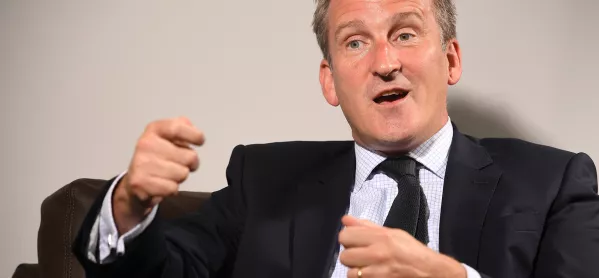Damian Hinds has pledged to protect teachers from “unnecessary burdens” after the Home Office said it wanted to give schools a legal duty to take action to prevent knife crime.
The education secretary used an exclusive Tes interview to reassure the profession over the controversial proposals that unions claim are "scapegoating" teachers.
Asked whether he was happy about teachers being held responsible for knife crime, Mr Hinds said: “Teachers do play an important role in these questions and always have.
“What I will make sure is that we don’t add unnecessary burdens on teachers because I have said many times before, teacher workload is a real issue, teachers are working too many hours, and we don’t want to add to that.”
Wilshaw: Knife carrying should not mean automatic exclusion, says former Ofsted chief
Quick read: American teachers' advice on tackling knife crime for British schools
Opinion: 'The knife-crime epidemic demands a complete rethink of safeguarding'
The proposals, announced on Monday, would mean that schools are held accountable if they fail to spot the warning signs of violent crime among pupils.
The consultation on the plan says that schools would be held to account “by their relevant inspectorates, or possibly through joint inspections”.
Tackling knife crime
Unions warned that the plan could “scapegoat” teachers, increase their workload and result in schools overwhelming police with unnecessary referrals.
Mr Hinds echoed the last of these concerns about the potential for schools to over-report problems.
“There is also the practical question that we know that if you have a requirement, or an over-requirement, on reporting things there is a danger of reporting overload, and it becomes harder to discern the very most important," he told Tes.
“I trust teachers to be able to spot the important things.”
When challenged that it sounded like the Home Office did not trust teachers in this way, Mr Hinds paused for several seconds before saying: “Look, we are in the stage of designing and evolving our approach to these matters.”
The education secretary stressed that the problem of knife crime was a “societal question”, saying: “Schools obviously are a part of this, but, like so many other things, there is a danger that people turn first and primarily to schools and say, ‘That’s how we can solve this problem’.
"I’m very clear that this is a much wider issue than just talking about schools.”
Mr Hinds also raised concerns that the political prominence currently given to knife crime could lead to more young people carrying the weapons.
He told Tes: “Right now, a big worry I have is that we are at the point of potentially accelerating self-replication, so the message gets out that young people carry knives, and that makes more young people carry knives.”
Asked whether there was a danger that the government’s high-profile launch of its approach to knife crime at Downing Street risked doing this, he said: “All coverage of any issue raises the profile of that issue. There is a question around this.
“To be fair, what is carried in the news covering a summit at Downing Street may be not as prevalent in young people’s vision as what’s on social media.”




